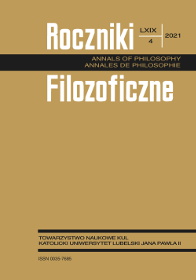On the Actual and Unavoidable Idolatry of Religion: An Answer to Polemicians
Abstract
The critiques of arguments I presented in Religia jako idolatria. Esej filozoficzny o nieuchronności elementów idolatrycznych w religii [Religion as idolatry: A philosophical essay on the inevitability of idolatrious elements in religion], authored by Błażej Gębura and Marcin Iwanicki, are fundamentally inaccurate. The main reason being that the authors of the critiques have not put forth any historical example of a religious phenomenon which was not idolatry. They only referred to logically possibly examples (it is admittedly possible to conceive of an act of religious worship which would not be idolatrical), yet they did not provide the conditions which would have to be fulfilled for this act to materialize; meanwhile the primary condition would be to change the ontic and epistemic status of humans as beings capable of direct contact with God. The more detailed arguments presented by my polemicians also do not disprove the claim that it is unavoidable for religion to be idolatrical. For if God accepts all acts of worship throughout history, He should be charged with defying fundamental moral principles; it is after all difficult to accept the bloody human and animal sacrifices he received. Furthermore, “religion zero” is impossible to actualize; on one hand it is a completely private phenomenon (analogous to a private language), on the other it means knowing God in a human way (and thus is idolatrical, as even the Author of the charge admits). Similarly, an unconscious act of worship (admiration for the tallest tree in the world) is an aesthetic experience, not a religious one; a theistic interpretation of this act bears the markings of symbolic violence and reduces religious experiences to experiencing beauty. There is no doubt that ontic distance as a necessary condition of non-idolatrical religion, proposed by the polemicians, actually makes it an impossibility. Even God cannot reveal Himself to us the way He is, but instead He must adhere to our cognitive limitations and thus can only reveal Himself as a non-God. Therefore, any religious act is unavoidably idolatrical; however, contrary to the claims by my Polemicians, this is not an overuse of the term “idolatry” in relation to religious phenomena, but rather an accurate description of their nature. Despite this, one should not eliminate religion entirely form social life; as long as religious people pose no harm to others and do not attempt to force their idols onto others, they have the right to freely believe and worship them.
References
Augustyn, św. 1998. Państwo Boże. Przeł. Władysław Kubicki. Kęty: Wydawnictwo Antyk.
Čapek, Karel. 2015. Fabryka Absolutu. Przeł. Paweł Hulka-Laskowski. Wydanie czwarte (dodruk). Warszawa: Dowody na istnienie. Wydawnictwo, Instytut Reportażu.
Frankowska, Maria. 1987. Mitologia Azteków. Warszawa: Wydawnictwa Artystyczne i Filmowe.
Gębura, Błażej. 2021. „O (domniemanej) idolatryczności religii”. Roczniki Filozoficzne 69, nr 4: 357–365 (tekst z tego numeru RF).
Iwanicki, Marcin. 2021. „Religia przez czarny monokl”. Roczniki Filozoficzne 69, nr 4: 367–380 (tekst z tego numeru RF).
Jan Paweł II. [1995] 2005. Encyklika Ut unum sint. W: Encykliki Ojca Świętego Jana Pawła II, 989–1077. Kraków: Wydawnictwo Znak, 2005.
Judycki, Stanisław, i Tadeusz Szubka. 1985. „Irracjonalne przedzałożenia czy racjonalna intuicja intelektualna (w związku z książką J. Życińskiego Teizm i filozofia analityczna)”. Zeszyty Naukowe KUL 28, nr 3-4, s.143-153.
Majcherek, Janusz Andrzej. 2015. Bóg bez znaczenia. Stare Groszki: Wydawnictwo CiS.
Nasr, Seyyed Hossein. 1988. Idee i wartości islamu. Przeł. Janusz Danecki. Warszawa: Instytut Wydawniczy PAX.
Obirek, Stanisław. 2015. Polak katolik? Stare Groszki: Wydawnictwo CiS.
Obirek, Stanisław. 2020. Wąska ścieżka. Dlaczego odszedłem z Kościoła. Stanisław Obirek w rozmowie z Arturem Nowakiem. Warszawa: Wydawnictwo Agora.
Pismo Święte. Stary i Nowy Testament, red. Michał Peter i Marian Wolniewicz. Poznań: Księgarnia św. Wojciecha, 2005.
Polak, Tomasz. System kościelny czyli przewagi pana K. 2020. Poznań: Wydawnictwo Nauk Społecznych i Humanistycznych Uniwersytetu im. Adama Mickiewicza.
Sienkiewicz, Henryk. 1989. Przez stepy. W: Henryk Sienkiewicz. Nowele. T. 2, 82–133. Warszawa: Państwowy Instytut Wydawniczy.
Sobór Watykański II. Konstytucje. Dekrety. Deklaracje. Tekst polski. Poznań: Wydawnictwo Pallottinum, [b.r.w.] — dokumenty: Dekret o Kościołach Wschodnich Katolickich (181–191); Dekret o ekumenizmie (203–218); Deklaracja o stosunku Kościoła do religii niechrześcijańskich (334–338); Deklaracja o wolności religijnej (414–426); Dekret o działalności misyjnej Kościoła (436–474).
Śnieżyński, Krzysztof. 2016. „Metafizyka w roli pasożyta w Winnicy Pańskiej? Dekonstrukcyjne uwagi na temat próby ratowania metafizyki (filozofii bytu) kosztem chrześcijaństwa w pometafizycznej kulturze”. W: Metafizyka i dekonstrukcja. W poszukiwaniu doświadczenia metafizycznego w kontekście wyzwań dekonstrukcjonizmu, red. Krzysztof Śnieżyński i Piotr Duchliński, 105–198. Kraków: Akademia Ignatianum i Wydawnictwo WAM.
Tomasz z Akwinu. 1971. Suma teologiczna, t. 19: Religijność. Przeł. Feliks W. Bednarski. Londyn: Veritas.
Tomasz z Akwinu. 1975. Suma teologiczna, t. 2: O Bogu, cz. II. Przeł. Pius Bełch, Londyn: Veritas.
Ziemiński, Ireneusz. 2015. „Problem Boga — między mitem a abstrakcją”. Filozofuj nr 6: 6–8.
Ziemiński, Ireneusz. 2016. „O (niemożliwości) dialogu między religiami”. Ethos 19, nr 1 (113): 243–258.
Ziemiński, Ireneusz. 2020a. „Chrześcijaństwo: powstanie i upadek mitu. Na marginesie książki Tomasza Polaka System kościelny”. Studia Philosophica Wratislaviensia 15, fasc. 4: 93–107.
Ziemiński, Ireneusz. 2020b. Religia jako idolatria. Esej filozoficzny o nieuchronności elementów idolatrycznych w religii. Szczecin: Wydawnictwo Uniwersytetu Szczecińskiego.
Copyright (c) 2021 Roczniki Filozoficzne

This work is licensed under a Creative Commons Attribution-NonCommercial-NoDerivatives 4.0 International License.





